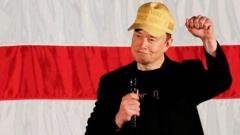In an audacious move aimed at influencing the upcoming presidential election, Elon Musk announced his intention to give away $1 million daily to registered voters in vital swing states until November 5, the election date. This initiative, orchestrated through his campaign group AmericaPAC, requires participants to sign a petition upholding pro-Constitution values. The first giveaway occurred at a town hall event in Pennsylvania, where a surprised attendee received a check.
However, the plan has drawn criticism from various political figures. Pennsylvania's Democratic Governor Josh Shapiro labeled the payments "deeply concerning" and expressed the need for law enforcement to evaluate their legality. The contest targets voters in key battleground states, such as Pennsylvania, Georgia, Nevada, Arizona, Michigan, Wisconsin, and North Carolina—all pivotal areas for the election outcome.
Legal experts are voicing significant concerns over potential violations of federal election laws. Rick Hasen, an election law specialist, articulated that the nature of Musk's financial incentive could be construed as illegal under federal regulations, which prohibit any financial payments or offers related to voter registration or voting itself. This scrutiny is heightened because only registered voters in these swing states may participate in the contest.
While Musk's campaign requires individuals to sign a petition promoting free speech and gun rights, Hasen expressed doubt regarding the motives behind this framework. He illustrated that the structure appears to target likely Trump supporters and questioned the ramifications of incorporating financial incentives into the electoral process, even if not explicitly linked to voting.
In Pennsylvania, Musk is incentivizing participation by offering $100 for signing the petition and an additional $100 for each referral. Voters in other battleground states are offered $47 per referral, which Musk argues falls within a legal loophole, as no direct compensation for casting a vote is being provided.
The tactic has sparked memories of past attempts to incentivize voting, including Ben & Jerry's 2008 campaign to give away ice cream on Election Day. The promotion intended to encourage voter turnout spuriously raised concerns about similar misinterpretations of legal allowances.
Musk, who has pledged substantial financial support to AmericaPAC in his push for former President Donald Trump's candidacy, seeks to galvanize millions of voters across these vital states. His campaign, described as fundamental to Trump's strategy, emphasizes key issues such as secure borders, free speech, and self-defense rights. Musk’s estimated wealth of $248 billion, making him the richest man globally, further complicates the ethical considerations of his substantial financial giveaways.
As the political landscape continues to shift ahead of the election, the implications of Musk's audacious strategy remain uncertain, with observers closely monitoring the evolving narrative surrounding transparency and influence in American electoral practices.





















